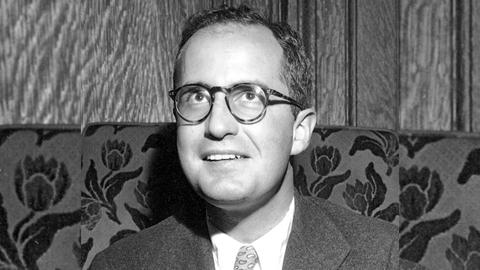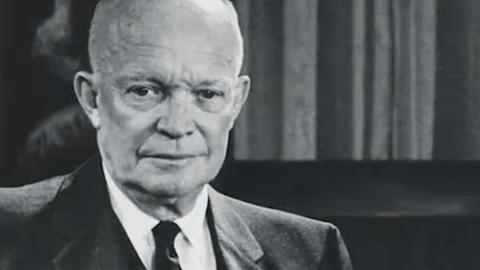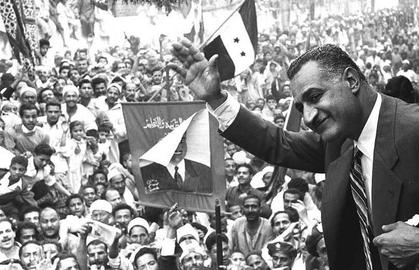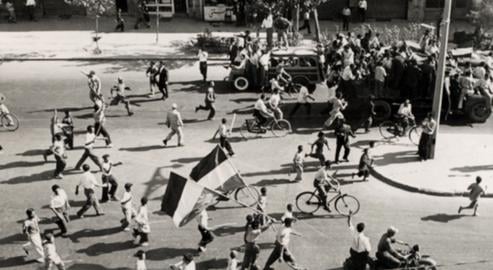The role and strength of the Israeli lobby in the US is clear to most observers. But those familiar with the history of the CIA know that there was once a very powerful pro-Arab lobby within the US establishment as well. Few historians have done more work to shed light on this history than Hugh Wilford, professor of history at California State University, Long Beach. Having trained in the US and UK as an intellectual historian, Wilford’s work has long featured small and powerful cliques in the US northeast who help drive the country’s foreign policy. His book The Mighty Wurlitzer: How the CIA Played America (2008) looked at how the CIA funded civli society groups in the US. His most recent book, America’s Great Game: The CIA’s Secret Arabists and the Shaping of the Modern Middle East (2013) tells the surprising story of three men who had a deep-seated alliance with Arab elites and who helped drive US foreign policy in the interests of the nascent Arab states in the early years of the Cold War.
As part of our series of interviews on the 1953 coup, IranWire was particularly interested in Wilford’s work on Kermit Roosevelt, the main organizer of the coup, and a CIA figure who features prominently in Wilford’s book America’s Great Game. Via a telephone interview, Professor Wilford spoke to IranWire about Kermit Roosevelt and his broader milieu.
***
You have done a lot of work on the CIA and its internal currents. We know that even under the Democratic administration, the CIA had plans for a coup in Iran. To what degree did the CIA have an autonomous role in launching plans for the coup? And to what degree were other people, including the US president and other politicians, responsible?
I think the change of administration between Truman and Eisenhower [in January 1953] was important. The Eisenhower administration was much more in favor of espionage and intelligence in general and covert action in particular. In this particular instance, i.e. the case of Iran, the Truman administration was a bit more inclined toward the Mossadegh government.
This is important context. It was down to the president to decide whether a particular operation should go ahead but I think the CIA was pushing for decisive action against Mossadegh since at least 1952, under Truman administration. In particular, the CIA director Allen Dulles and Kermit Roosevelt in the near east division, both favored covert operation against Mossadegh. The idea of the coup originated with the British but the important stage was when they got Kermit Roosevelt on board.
This is still the early years of the cold war and the early years of the CIA, which had only been founded in 1947. The national security apparatus was still in flux at this point and a lot of organizational working out was still to be done. A lot of it was down to individuals. Allen Dulles and the incoming secretary of state, John Foster Dulles, both knew Roosevelt personally and were inclined to listen to him about the Middle East because he claimed to be an expert on the subject and there was not a great amount of expertise on the Middle East around in Washington at that point. So, Roosevelt personally had big clout and when he suggested covert action, they listened to him.
So, to some extent the CIA was pushing the agenda. But Roosevelt and the Dulles brothers came from the same social and political circles. There definitely was a foreign policy establishment at this point. So, in some ways, the distinction between the CIA and the State Department and the line dividing them was quite gray.
In your book, you talk about the “Arabists” in the CIA. This is somewhat new to many readers. Usually we hear a lot about the pro-Israeli lobby in the US. But you portray the Arabist lobby and characters like Kermit and Archie Roosevelt and Miles A. Copeland Jr. very colorfully. Why were they called the Arabists and to what degree did they drive US policy toward the Middle East?
They were quite young men at this point. The CIA was a young institution and all of these people, the Roosevelt cousins and Copeland, had acquired experience of the Middle East during the Second World War, by serving in the intelligence community, [and] the Office of Strategic Services [OSS, the precursor of the CIA] in the case of the most important of three, who was Kermit Roosevelt.
As they experienced their first posting in the region, they came into contact with people like William Eddy, who was descended from Protestant missionaries to the region. Eddy’s family, for instance, were very important in the history of the American University of Beirut, which is the foremost university in the Levant. People like Kermit Roosevelt became knowledgable about the region and they served in it and studied it but they also inherited from people like William Eddy a sort of sympathy for the Arab civilization and they took that side in the emerging Arab-Israeli conflict.
Perhaps surprisingly, given his involvement in the Iran coup and that he helped overthrow the Iranian nationalist Mossadegh, Kermit Roosevelt and his colleagues actually tried to promote the Arab nationalists in the region in the early years of the Cold War, in particular the Egyptian leader, Gammal Abdul Nasser. Roosevelt was also instrumental in creating an organization within the United States called the American Friends of the Middle East. They got covert money from the CIA and tried to counter the growing influence of the Israeli lobby on American foreign policy.
These Arabists within the CIA were friends of the Arab nationalist cause and supporters of the Arab states in their growing confrontation with Israel. Because somebody like Kermit Roosevelt had a lot of influence over US foreign policy, in the early years of the Cold War this was a really powerful impulse in American foreign relations and its approaches to the Middle East. But it faded as the 1950s wore off, for a variety of reasons, including the growing power of the Israeli lobby within the United States.
Ultimately, Roosevelt and his allies in the American Friends of the Middle East couldn't marshal the resources to outweigh those of the Zionist organizations.
Kermit Roosevelt is somewhat of a household name in Iran because of the role he played in the 1953 coup. But we actually don't know a lot about his past. What kind of a character he was? Why did he come to play such an emphasis on overthrowing the democratically elected government of Iran and in defeating the oil nationalization movement?
Roosevelt was very much an American aristocrat, a grandson of President Theodore Roosevelt, educated at very elite institutions like a private school in New England called Groton, which produced a number of important figures in the American foreign policy establishment in the early years of the Cold War. He later went to Harvard. As I mentioned, in the second world war, he served in the OSS in Cairo and he became this expert on the Middle East and a friend of Arab nationalist leaders such as Gammal Nasser and an advocate of the Arab cause in the conflict over Palestine. But, at the same time as he was a pro-Arabist, he was a member of the American ruling class and an anti-Communist who was worried about nationalism in the third world and also the influence of Moscow and the spread of communist power in Iran.
It is also worth saying that he was kind of a romantic adventurer. He grew up reading Rudyard Kipling and spy thriller writers of the days of the British empire. he was very influenced by the figure of the Lawrence of Arabia, T. E. Lawrence, who his father actually knew during the First World War.
Despite being knowledgeable about the Middle East and being somewhat of a friend of the Arab World, he also liked playing spy games, which is why I called my book America’s Great Game. One of the reasons that, at the same time as he was backing the Egyptian Nasser, he was overthrowing Mossadegh, was because he saw Iran as somewhere he could go and have adventures and play spy games and promote what he saw as American interests in the region — although subsequently the CIA actions during 1953 returned to haunt the US.
Your work is mostly focused on the Arab world. Where does the CIA’s connection to Iran come into the picture? Was there anything similar to the Arabist lobby inside the CIA and the intelligence services, somehow connected to Iranian political forces?
Sadly, at least in the case of Kermit and Archie, who were important in the CIA and quite influential in the US Middle East policy at this time, they seem to have sympathized with the Arabs and the Arab side in the Arab-Israeli conflict, but they don’t seem to have felt the same sympathy for Iranians. It seems that there was this powerful tradition, within the British and then American foreign policy, of Orientalism — of taking a typically negative view of Iranians. Although that sort of Orientalism seems to have been mitigated in the case of the Roosevelt cousins’ approach to some countries, it was not the case with Iran.
Archie Roosevelt served in Iran the late 1940s and he subsequently makes a number of Orientalist statements on Iran and the Iranians he met. Kermit Roosevelt, later in his memoirs of his involvement in the coup in 1953, Countercoup, made a lot of statements that were blatantly Orientalist toward Iranians. It doesn’t seem that they had the same degree of sympathy and investment in Iran as they had in the Arab world. Perhaps this reflects the fact that Roosevelt had served in Cairo during the war and had contact with people like William Eddy and was therefore friendly toward the Arab world, but didn't have that sort of personal history with Iranians. This is one of the reasons why he found it easy in 1953 to go to Iran and overthrow Mossadegh. At the same time, he was supporting another nationalist figure in the Middle East, Nasser.
Read the other articles in the series:
What was the Clergy’s Role in the CIA-led Coup of 1953?
“The 1953 coup opened the road for religious fundamentalism”
The 1953 Coup and the Mossadegh Myth
Twelve Years a Democracy in Iran (1941-1953)
Many Actors Should Get the Blame for the 1953 Coup
Khomeini Predicted Mossadegh Would be “Slapped by Islam”
Communists Tried to Stop the 1953 Coup — But it was “Too little, too late”
visit the accountability section
In this section of Iran Wire, you can contact the officials and launch your campaign for various problems




























comments